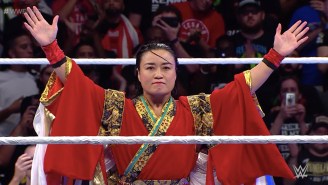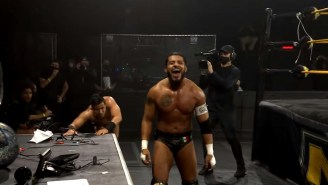I love the Royal Rumble. I think most wrestling fans do, it’s one of those things that it’s almost impossible not to get swept up in, and it’s always one of the most exciting and surprising things WWE does in a year. But as this year’s Rumble approaches this weekend and I find myself obsessing over how it works, I think there’s a pretty big flaw. Not in the event itself, but in the event as a storytelling tool that exists in the ongoing narrative that WWE is constantly building, tearing down, and building again.
The event itself is brilliant in just about every respect, and part of that is because it’s so much bigger and so different from the average wrestling match. It’s a departure from everything we think of as pro wrestling — the very idea of having to throw someone over the top rope to win is so compelling for that very reason. It’s the exact opposite of winning a match by pinning someone’s shoulders to the mat, and throwing 30 people into the ring isn’t just making it fifteen times bigger than a singles match, it allows for factions to form, teams to unite or divide against each other, and massive feats of strength.
The storytelling potential in the Rumble is incredible, too. Even staggering the entrances at two minutes apart creates the instant suspense of wondering who’s going to come out next, or for different factions to gain and lose the advantage as teammates and rivals hit the ring — and they make it such a long match that you can have entire stories play out in a single night. Remember when CM Punk and the Nexus owned the ring for half an hour, throwing out anybody who got in by sheer force of numbers? Or when John Cena made his surprise comeback and the whole arena lost its mind? It’s great.
So yeah, if anybody wonders why Pat Patterson’s in the Hall of Fame, there it is: One of the most inherently exciting and dynamic nights of the year, presented in a form that’s almost impossible to screw up. But there’s a catch.
The Royal Rumble isn’t its own thing. It’s not an end unto itself; it’s the lead-in to something else, with the winner being granted that all-important title shot in the alleged main event of WrestleMania. On paper, that’s great — if there’s one thing that WWE has done an amazing job of over the past 30 years, it’s been building the mythology of WrestleMania up as something greater than just a wrestling event. As their marketing is always quick to remind us, it’s the showcase of the immortals, and winning the Rumble gives a wrestler the chance to stand alongside those legendary matches like Hogan and Andre, Savage and Steamboat, Rock and Austin or, uh, LOD 2000 and the New Midnight Express. Classics, all.
In reality, though, the reward doesn’t really seem to be all that worth the trouble. In the modern era of wrestling, title shots aren’t exactly hard to come by — among the small number of wrestlers that get title shots, at least. The winner of the Royal Rumble may get a guaranteed match in April, but if you lose? Don’t sweat it, maybe you can get in the title match at Elimination Chamber. Or on Raw and Smackdown, both of which had title matches in the past month, one of which involved a new champion. And hey, if you miss out on all of those, there’s still the title matches that are definitely going to be part of the card at the ten other Pay-Per-View events scheduled before next year’s Royal Rumble.
And that’s before we talk about how there are two world championships.
Don’t get me wrong, that’s not really a complaint. I like seeing title matches. I like seeing the championships defended often and I like seeing unexpected title changes, because on a certain level, I think it helps make them a legitimate concern within their storylines. The reason CM Punk’s 598-or-whatever-day title reign is a big deal is that we’ve seen him defending that belt constantly. It means something that he’s held onto it time and time again, but it also means that in storytelling terms, his defense against Chris Jericho at WrestleMania doesn’t mean anything more or less than his defense against The Ryback on Raw.
The thing is, it should be. It should be a huge deal, because winning the Royal Rumble should be a huge deal. It’s a triumph over virtually everyone else in the company, clawing to the top through brute force or clever tactics and — thanks to the “random” entry order, another brilliant aspect of the match — a strong helping of luck. The Royal Rumble feels big, but with that kind of schedule, the reward doesn’t feel like it matches up.
Because really, even if you find yourself in the “Main Event” at WrestleMania, there’s a chance it might be an 18-second comedy match that opens the show, and if the Rock has a movie to promote, I’ve got some bad news for your chances of going on last.
So how do you fix it? I’m not sure. I like the idea that the Rumble can catapult an unexpected contender into the title picture, or give a wrestler the ability to fight his way through evil machinations by sheer toughness and triumph over everything trying to keep him from the top prize in the sport, or prove someone’s faith in their destiny to be the best. I even like the long gap between the Rumble and WrestleMania, because it gives a story some breathing room that the constant schedule of two weekly shows and a PPV every month doesn’t. All that stuff is great.
But at the same time, it’s stuff that I feel like the Money in the Bank match has done better in recent years. Like the Rumble, MITB has that dynamic excitement, that subversion of the rules, that chance for wrestlers to show off their skills in a way that a normal match doesn’t allow for. Most importantly, though, it plays on the modern era’s schedule by giving the winner that “anytime, anywhere” title shot. It brings that element of unpredictability to every show, and allows for fakeouts and the quick elevation of new talent in a way that the Royal Rumble doesn’t.
Also, the winner gets to carry around that cool briefcase, which is both a nice visual signifier and a nifty fashion accessory.
Of course, it also adds something that even further devalues the Rumble winner’s guaranteed title shot, which brings us back to the original problem. How do you craft a reward that’s on the same level with a win like the Royal Rumble when you’re giving that same reward to John Cena on a biweekly basis? Well, maybe that’s the solution.
Maybe instead of a title shot at WrestleMania, the winner of the Royal Rumble just gets to be John Cena for a year, with unlimited title shots and the ability to kick out of everybody’s finisher all the time. I’d watch it.






